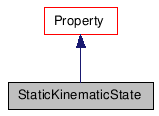Detailed Description
The StaticKinematicState object represents the base pose of an object. Objects that have access to the StaticKinematicState object include:
The static kinematic state on objects is created when applying envelopes, deform-by-spine or deform-by-curve operators. Currently an object can only have one static kinematic state. It represents a snapshot of the pose of the object when the Envelope, DeformBySpine or DeformByCage operator was applied. It is also changed when doing Set Reference Pose in the Animate|Deform|Envelope menu (see the SetEnvelopeRefPoses command). If an object has all 3 operations applied on the same object they will all share the same static kinematic state. When doing a cage deform on top of an envelope for example the later operation will reset the static kinematic state. This means that it's usually better to be in the reference pose when adding these deforms ( ResetActor).
The static kinematic state on clusters is created when the cluster is translated, rotated or scaled by the movecomponentop MoveComponent operator . The static kinematic state is the transformation applied by the MoveComponent operator on the cluster. There is one or possibly two static kine state per move component on a cluster. Therefore you end-up with multiple static kine on a cluster if you transform the cluster many times. The second static kine state on the cluster is created when moving clusters in relative mode.
- See also:
- Cluster::HasStaticKinematicState, Cluster::GetStaticKinematicStates, KinematicState, X3DObject::HasStaticKinematicState, X3DObject::GetStaticKinematicState
- Example:
using namespace XSI;
Application app;
Model root = app.GetActiveSceneRoot();
Null myNull;
root.AddNull( L"", myNull );
KinematicState nullGlobalKineState(myNull.GetKinematics().GetGlobal());
Parameter param(nullGlobalKineState.GetParameters().GetItem(L"posx"));
param.PutValue( (double)4.0 );
param = nullGlobalKineState.GetParameters().GetItem(L"posy");
param.PutValue( (double)3.0 );
X3DObject mySphere;
root.AddGeometry( L"Sphere", L"MeshSurface", L"", mySphere );
param = mySphere.GetKinematics().GetGlobal().GetParameters().GetItem(L"posz");
param.PutValue( (double)2.0 );
CRefArray deformers(1);
deformers[0] = myNull;
Envelope myEnvelop;
mySphere.ApplyEnvelope( deformers, siUnspecified, siUnspecified, myEnvelop );
app.LogMessage( mySphere.GetStaticKinematicState().GetClassIDName() );
#include <xsi_statickinematicstate.h>

Public Member Functions |
|
| StaticKinematicState () | |
| ~StaticKinematicState () | |
| StaticKinematicState (const CRef &in_ref) | |
| StaticKinematicState (const StaticKinematicState &in_obj) | |
| bool | IsA (siClassID in_ClassID) const |
| siClassID | GetClassID () const |
| StaticKinematicState & | operator= (const StaticKinematicState &in_obj) |
| StaticKinematicState & | operator= (const CRef &in_ref) |
| MATH::CTransformation | GetTransform (double in_dFrame=0) const |
| CStatus | PutTransform (const MATH::CTransformation &in_transf, double in_dFrame=0) |
Constructor & Destructor Documentation
Default constructor.
| ~StaticKinematicState | ( | ) |
Default destructor.
| StaticKinematicState | ( | const CRef & | in_ref | ) |
Constructor.
- Parameters:
-
in_ref constant reference object.
| StaticKinematicState | ( | const StaticKinematicState & | in_obj | ) |
Copy constructor.
- Parameters:
-
in_obj constant class object.
Member Function Documentation
| bool IsA | ( | siClassID | in_ClassID | ) | const [virtual] |
Returns true if a given class type is compatible with this API class.
- Parameters:
-
in_ClassID class type.
- Returns:
- true if the class is compatible, false otherwise.
Reimplemented from Property.
| siClassID GetClassID | ( | ) | const [virtual] |
| StaticKinematicState& operator= | ( | const StaticKinematicState & | in_obj | ) |
Creates an object from another object. The newly created object is set to empty if the input object is not compatible.
- Parameters:
-
in_obj constant class object.
- Returns:
- The new StaticKinematicState object.
| StaticKinematicState& operator= | ( | const CRef & | in_ref | ) |
Creates an object from a reference object. The newly created object is set to empty if the input reference object is not compatible.
- Parameters:
-
in_ref constant class object.
- Returns:
- The new StaticKinematicState object.
Reimplemented from Property.
| MATH::CTransformation GetTransform | ( | double | in_dFrame = 0 |
) | const |
Returns the base pose from an object.
- Parameters:
-
in_dFrame Frame at which to get the transform.
- Returns:
- The transformation object.
| CStatus PutTransform | ( | const MATH::CTransformation & | in_transf, |
| double | in_dFrame =
0 |
||
| ) |
Sets the base pose of an object.
- Parameters:
-
in_transf The transformation object. in_dFrame Frame at which to set the transform.
- Returns:
- CStatus::OK success
- CStatus::Fail failure
The documentation for this class was generated from the following file:
